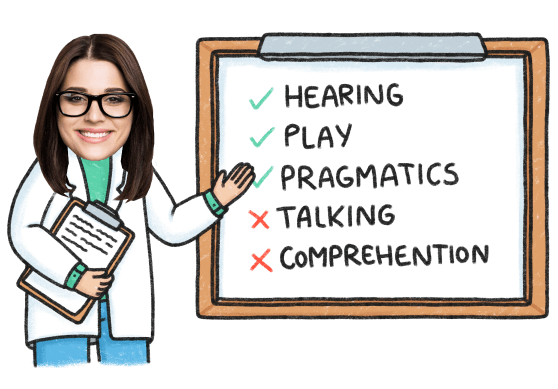Pacifiers: The Pros and Cons
Feb 11, 2022 Many parents joke around about pacifiers being their new best friends. Some even say they’re a life savior; but is it always good to use them? Is there an age they should stop? And most importantly, can a pacifier affect a toddler’s speech and language development? This article explores the pros and cons of using a pacifier, and whether or not it can affect a child’s overall language development.
In This Article
What is a Pacifier?
An online Cambridge dictionary says that “a pacifier is a rubber or plastic nipple for a baby to suck or chew on.” Studies show more than 80% of infants use them, often as a self-soothing method. They come in different shapes and designs and also different sizes, depending on a baby’s age.
Are you on track with your baby’s milestones?
Take our short questionnaire about your child’s speech and language development to learn more about your milestones!
What are the Pros of Using a Pacifier?
- In addition to bringing comfort and helping control their emotions, pacifiers can make a baby feel secure.
- Some research says they can help when it comes to preventing SIDS, as you use it during nap or bedtime. (SIDS or sudden infant death syndrome is the inexplicable death of a baby, usually less than one year of age).
- They help premature babies. Indeed, research has demonstrated that using a pacifier on a premature baby can aid them when it comes to digestion. Pacifiers encourage and promote the sucking reflex.
- Traveling with your baby? No worries. In addition to being used as a soothing method, when on airplanes, sucking on a pacifier can relieve and equalize the pressure in their ears.
- They can calm a baby when they have colic or even after getting vaccinated.
What are the Cons of Using a Pacifier?
- Using a pacifier can lead to ear infections. Much research shows that babies using a pacifier continuously are twice as likely to get an ear infection compared to those who don’t.
- Using a pacifier for too long can lead your baby to be dependent on them, making it extremely difficult to break the habit.
- Though some research states pacifiers do not disrupt breastfeeding, other studies suggest introducing a pacifier too early on (as early as a week old) can in fact interfere with a child’s feeding time. More precisely, because of its soothing and relaxing benefits, overusing or using it too early could make your baby sleepy during feeding time.
Pacifiers and Language Development
Many speech therapists will advise or encourage parents to get rid of pacifiers after the ages of 1 or 2. This is because, in addition to the risks of ear infections and other issues, using them for a long period of time can lead to oral problems that potentially affect a child’s speech and language development. For instance, continuously utilizing a pacifier may cause your toddler to have dental problems or have an anterior open bite. Other potential damage may include an indented palate, leading to a larger cavity affecting a child’s articulation skills.
Boost Your Child’s Speech Development!
Improve language & communication skills with fun learning!

What Should I Do if My Child Doesn’t Want to Stop Using it?
While it may be challenging at first, there are a few ways in which you can prevent your baby from using a pacifier.
- It is often recommended to get rid of a pacifier gradually. For instance, if your toddler uses it all day, start by telling them they can only use it during nap or bedtime. Later on, having them use the pacifier only at bedtime and eventually, taking it away.
- If this method does not work, you can poke a hole, (it will stop providing suction).
- Though this might seem a bit extreme, you can use lemon or aloe vera juice (if they are not allergic of course). Indeed, soaking their pacifier in lemon or aloe vera juice will not only lead to a bitter taste, but it will also discourage them further from further use.
- And of course, some positive reinforcement! Whenever you see your toddler without a pacifier, make sure to reinforce that behavior by praising them, either by giving them their favorite cookie or buying them a small toy. Use these moments as little celebrations for them to feel happy and to also encourage them to no longer use it.
Pacifiers and Speech Therapists’ Takes
Pacifier use is known to be soothing and will also satisfy the sucking reflex. And though they make your baby feel secure, pacifiers can be damaging if used for a long period of time. In addition to ear infections, overusing them can lead to oral problems or even dependency.
If your toddler is continuously using a pacifier and refuses to give it up, don’t lose hope. From positive reinforcement to poking holes, there are several methods to help your child get rid of it. They may not be easy, but preventing oral damage or ear infections down the line may be well worth 100 tantrums.

